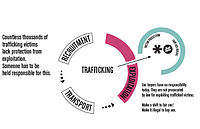
Photo from wikipedia
Medeiros and Griffith (2019) bring to the forefront the important role that industrial and organizational (I-O) psychologists have on the front lines of preventing sexual offenses by empowering and equipping… Click to show full abstract
Medeiros and Griffith (2019) bring to the forefront the important role that industrial and organizational (I-O) psychologists have on the front lines of preventing sexual offenses by empowering and equipping employees via workplace trainings. This role cannot be denied, nor can it be overemphasized. However, it is also arguably shortsighted when viewed only within the bounds of employee-on-employee (or employee-on-client, etc.) sexual harassment/assault. That is, such a limited scope necessarily overlooks the notable potential that some workplaces have for reaching beyond their own walls to curb sexual offenses in the broader domain. To that end, we suggest that the insights of I-O psychologists in this area are applicable in responding to the humanitarian crisis of sex trafficking, one of the most visible facets of the broader problem of human trafficking. Sex trafficking—human trafficking for the purposes of sexual exploitation—is one of the most pervasive and devastating sexually based crimes of our time (United Nations Office on Drugs and Crime, 2012). Although sex trafficking does not operate within a particular company or corporation, it does operate through various businesses across a variety of sectors. Thus, there are a wide range of industries wherein employees are more likely to encounter trafficking victims, including the hospitality, transportation, and healthcare industries. Perhaps most notably, the hospitality industry plays a key role in sex trafficking, as hotel rooms are a common location for commercial sex. Indeed, the National Human Trafficking Hotline identifies hotels and motels as the location of approximately 70% of cases of reported sex trafficking, with traffickers commonly renting rooms out of which to run their operations. Although recent years have yielded advice to hotel guests to photograph their hotel rooms to aid in the investigation of sex trafficking (e.g., traffickcam.com by The Exchange Initiative), the power also lies more broadly with hotel chains and their employees, who are especially likely to encounter trafficking situations. In particular, these employees are in a unique position to recognize key industryspecific trafficking indicators, such as hotel guests paying in cash, travelers with little or no luggage, or a steady flow of different men visiting the same room (ECPAT-USA, 2017). As such, when hotel employees are trained to attune to these indicators, they are empowered to take action by reporting the suspected trafficking to authorities. Indeed, between 2008 and 2015, over 1,400 calls and texts to trafficking assistance hotlines originated from hotels (Polaris Project, 2015), indicating the important role that employees in this industry can play in curbing sex trafficking. A related industry similarly likely to encounter trafficking victims is the transportation industry. Indeed, transportation modalities, such as taxis, ride-sharing programs, buses, and commercial trucks, are common means via which to transport victims, as well as means used by victims themselves in attempts to escape the trafficking trade. Moreover, transportation hubs—for example, truck stops, bus and train stations, and airports—are common locales used by traffickers to target potential new victims. Convenience stores likewise occupy a key place in the trafficking process due to their access to transportation modalities. These businesses—particularly those
Journal Title: Industrial and Organizational Psychology
Year Published: 2019
Link to full text (if available)
Share on Social Media: Sign Up to like & get
recommendations!